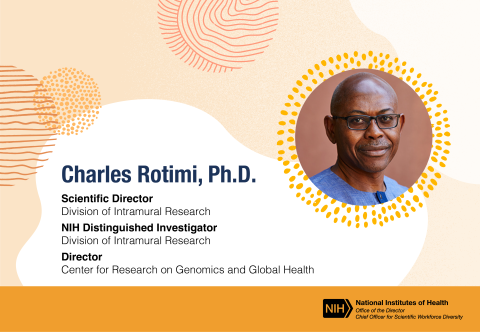
As we commemorate Black History Month, I encourage you to reflect upon the abundant contributions made by Black Americans over the course of our nation’s history. For centuries, Black Americans have been integral to our nation’s progress in many fields, including science, health, and medicine—even though their earliest contributions were often known only to those who were helped or healed.
During this Black History Month, I am reminded of how fortunate I am to be in a position to affect change at an institution committed to diversity, inclusion, and enhancing racial and ethnic equity. It has been the greatest privilege of my life to be involved with NIH as we are at a turning point for focusing on these issues. I am deeply grateful for the opportunity to co-lead the NIH UNITE initiative and lead the COSWD team.
We are often asked what is NIH doing? How can we ask outside institutions to address racial and ethnic equity if we do not have our own house in order—particularly as it pertains to African American and Black scientists?
At NIH, scientists and researchers of the African diaspora have made significant contributions across a wide range of areas. All their achievements contribute to the overall success of NIH.
Nonetheless, there is room for enhanced diversity among our intramural scientists. Since its establishment in 2018, the NIH Distinguished Scholars Program, which is open to all who promote DEIA, has seen an increase in the diversity of tenure track scientists, including women and individuals from racial and ethnic groups underrepresented in the sciences.
An example of progress in this area is the story of one NIH scientist who was recently competitively selected to serve as scientific director at an institute. Charles Rotimi, Ph.D., demonstrates the positive impact of a diverse, inclusive workforce that allows individuals to contribute the breadth of their talents to help solve the world’s most critical issues.
Raised in a humble home in Benin City, Nigeria, Dr. Rotimi immigrated to the United States after studying biochemistry at the University of Benin in Nigeria. Like many scholars, he had options but chose educational opportunities in the United States.
In the U.S., Dr. Rotimi studied biochemistry, health care administration, and epidemiology. His work studying hypertension in the African diaspora eventually led him to Howard University, where he was director of the National Human Genome Center. He later came to NIH, where he is now director of the Center for Research on Genomics and Global Health and the scientific director for the National Human Genome Research Institute (NHGRI).
Dr. Rotimi directs multidisciplinary investigators who study disease distribution in different populations, identifying the genetic, social, and lifestyle determinants of diseases. His team published the first genome-wide scan for hypertension and blood pressure in African Americans and for type-2 diabetes in West Africans. His lab currently conducts genetic epidemiology research projects in multiple ethnic groups in the U.S., Africa, and China.
Sensitive to the needs of different populations, Dr. Rotimi advocates for culturally sensitive communication about science. He says, “When you are doing community engagement, you have to have an open mind and be prepared to deal with issues you did not think about as a scientist.”
Through Dr. Rotimi’s study of diverse human populations, we are learning more about evolutionary history and how this history may inform susceptibility and resistance to disease and responses to drugs. To learn more about Dr. Rotimi, I encourage you to watch his interview on the NHGRI Oral History Collection.
Dr. Rotimi is just one example of scientific excellence at NIH. For me, Dr. Rotimi—and so many Black scientists, researchers, public health professionals and administrators, and support staff—demonstrate the power that is possible when we all work together to live up to the ideals of our nation.
I’m optimistic that through better policies, more enlightened thinking, and the work of scientists with diverse backgrounds at NIH, we’re helping to improve health outcomes for all Americans.

